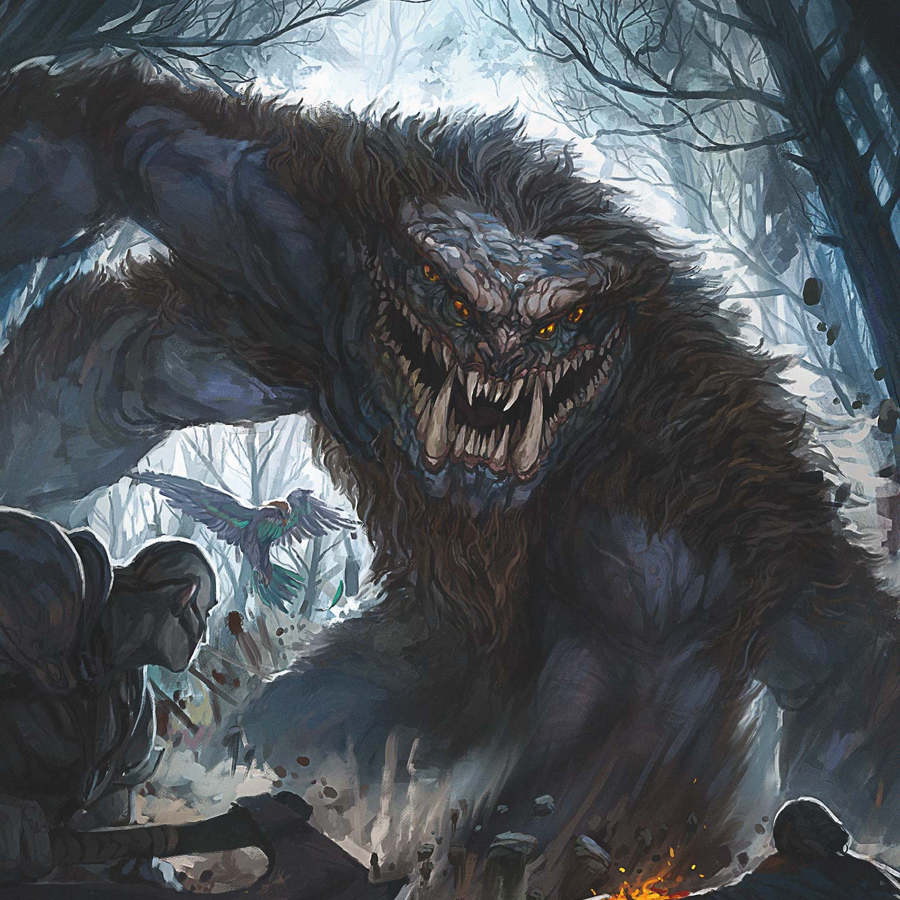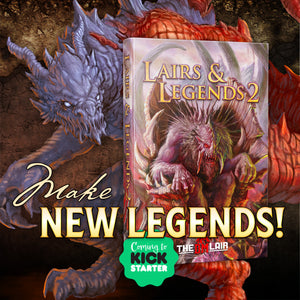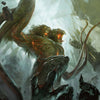Ed Greenwood's Game Mastering Secrets

Written by Luke Hart
I attended Gary Con and had the privilege of sitting in a GM Masterclass panel run by Ed Greenwood and Andrew Valkauskas. Ed Greenwood is the creator of the Forgotten Realms campaign setting, and Andrew created the Fate of The Norns role-playing game.
I have been reading Forgotten Realms novels and running my games in that campaign setting since I was a little kid. So, you can imagine my excitement as I sat at the feet of masters with my notebook and pen ready. As follows are the 10 game master secrets I walked away with.
Watch or listen to this article by clicking the video below.
#1 Flip the Script
When you’re designing adventures and running games, seek to upset or overturn expectations. Do things that are unexpected, but don’t just make it random crap.
For instance, during a game, my players were at the end of the adventure confronting the Big Bad, whose cronies were running a laboratory. Now, they had just been murder-hoboing their way through the adventure up until that point, even though the creatures living there hadn’t initiated hostilities.
However, they then learned why the Big Bad was at the laboratory: he had been treated horribly by a nearby village, mocked, ridiculed, and outcast, left to die in the wilds. And now he was bent on visiting justice—mixed with a bit of revenge, I suppose—on the villagers. When my players learned this, instantly, two of them sympathized with the creature, no longer wished to harm him, and felt perhaps a bit guilty about what they had been doing up to that point.
#2 Characters Are Not the Prime Movers
You should strive to make your game world feel larger and grander, and one way to do this is by placing powerful personages and factions in the world that work behind the scenes. Of course, your players’ characters are in the spotlight of your game—that’s all well and good—but they should get the sense that more is going on in the world than just the adventures they personally undergo.
They should feel that other powerful factors are influencing the region and the wider world. As a game master, you can accomplish this in a variety of ways: rumors the characters overhear at the tavern, other adventuring parties that pass through town and rub elbows with the players’ characters, or powerful people and factions that influence or set in motion the very quests your players will go on. And those are just a few examples.
#3 The Importance of a PC Backstory
Besides the standard reasons for players wanting backstories, there is another important one: characters must know why they are working with the other characters. The reason for that should be baked into each character’s backstory. This helps the group avoid one of the classic RPG pitfalls: characters with no reason to work with the other PCs and consequently wander off on their own. Yes, good players will stay together anyway, but even good players are well-served by having roleplaying reasons to adventure with the other characters.
#4 Give Your Players Something to Do
There’s an idea floating around out there that a game master need only create the world and then plop the players’ characters into the middle of it. It is then up to the characters to find something interesting to do in the world. This sort of gameplay might appeal to some groups, but it often leads to directionless and pointless hours of characters wandering around, essentially doing nothing of interest—in other words, boring games.
Instead, the game master should give the characters options and choices of things they might do. These are your traditional plot hooks that point them to adventures they might go on, quests they might undertake, and the like.
#5 Everyone Loves a Mystery
Put something mysterious in your world—or a handful of mysterious somethings—upon which the fate of the world does not depend. Having a mystery around which your campaign is built is ordinary—not a bad thing to do, but it’s ordinary; it’s expected. Instead, you should also have other mysterious dotting the game world that your players come across.
Those mysteries might lead them on side quests; they might be small curiosities that are investigated and resolved in but a portion of a game session, but any way you slice it, they should be considered optional. Things your players may or may not care to investigate. They are there purely there to enrich the game.
#6 Timekeeping Is Not Optional
Timekeeping isn’t the sexiest of things for game masters, but when done correctly, it can add flavor and realism to your campaign, making your game and world come to life and feel real to players. It’s obvious to track the dates of things your players have done or upcoming dates of things that will affect characters. However, beyond that, consider keeping track of things in the larger world—things that have nothing to do with the PCs but that they might hear about and might indirectly affect what happens around them.
Furthermore, track the small local stuff. For instance, next week on Wednesday, there is a parade through the village to commemorate the christening of the local church. Know when the local holidays are, and describe them as they come to pass. This sort of attention to detail can elevate a game from decent to great.
#7 Game Prep Is Paramount
Lazy game masters the world over probably cringe every time I harp on the subject of game preparation—because I am a firm believer in the GM spending quality time preparing for their games. And Ed Greenwood upheld my longtime stance on this when he uttered one simple sentence: “It’s better to prepare more than less.” Even if you are a masterful GM with decades of experience, your game will be better the more you prep for it. Yes, you may still be able to run a good game with no prep. But imagine what you could do if you actually tried.
#8 The World Rolls On
Things happen in the world even if the characters do nothing. Remember how you gave them the choice between three different quests? Save the dragon from the evil princess; rescue the kobolds from their imprisonment in the sewers; or capture and tame owlbears to use as mounts? And we all know your players went after the owlbears.
So, while they were doing that, the princess carved up the dragon and served him as steak at a banquet, and the kobolds all died from disease in the foul, nasty sewers. Now, it doesn’t have to be as dramatic as that, but your players should get the feeling that the world around them is moving forward and changing, and things are happening, sometimes in response to what they do or don’t do, and sometimes quite independently.
#9 Get Better by Doing
As game masters, we all want to run awesome games in which we and our players have tons of fun. However, we can sometimes fall into the trap of thinking that we should be able to do that instantly, right out of the gate. And yet, as with most things in life, becoming good at something requires experience: time spent doing that thing and intentionally trying to improve. I mention this last part because we have all known people that have done X thing for years and decades and yet still suck at it. If you aren’t committed to continual improvement, then seniority and time on the job are rather meaningless.
#10 A Word on Disruptive Players
All game masters have to deal with problem players from time to time. It comes with the territory. Ed shared something really cool and yet also rather simple: remind disruptive players that they will get out of the game session whatever they put into the game session. And I think that’s true for all of us, game masters and players. The higher quality that we put into our role-playing games, the higher quality we’ll get out of them.
Imagine how awesome a game is going to be if the GM and every player at the table are doing their best to contribute in positive ways in order to make the game as fun as possible for everyone else. They don’t just think of themselves, but they consider, “How can I make this game better for the others sitting here at the table with me?”
100 Years of GM Experience at Your Fingertips!
Are you a NEW GAME MASTER feeling a bit overwhelmed by everything involved with running a role-playing game? Are you a VETERAN GAME MASTER looking for new tips and tricks to take your games to the next level? Look no further than the Secret Art of Game Mastery.
We at the DM Lair have distilled our CENTURY of accumulated GM experience into an easy-to-read guide of practical advice that you can immediately apply to your games! We've even included our own templates–the things that we use to prepare our ACTUAL games.
Get all three books to master your game:
- The Secret Art of Game Mastery. Contains over 100 years of GM advice distilled into an easy-to-read format. It introduces and explains the tools of the trade, scheduling, playstyle, post-game notes, getting player feedback, and more.
- The Secret Art of Preparation. Brings to your fingertips the actual templates and guides that the DM Lair team uses to prepare games, Lair Magazine, and more. Designed as a three-ring binder, it's intended for you to write directly into for your entire campaign!
- The Secret Art of Notetaking. Gives you the keys to tracking your campaign from session to session just like the DM Lair team. Designed as a three-ring binder, it's intended for you to write in and keep track of your whole campaign!
With so much knowledge and experience on its pages, The Secret Art of Game Mastery is guaranteed to become an indispensable tool for all game masters, new and veteran alike. And if that isn’t enough, the information applies to all game systems and all genres!
-
Posted in
Game Master How-To Articles







